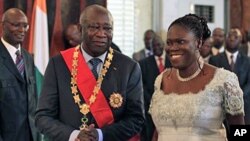ABIDJAN —
The International Criminal Court has unsealed an arrest warrant for former Ivory Coast First Lady Simone Gbagbo for alleged crimes against humanity during post-election violence. However, it's unclear whether the Ouattara government will extradite her to the Hague, and Ivorians are divided on whether she should instead be tried home.
Ivorian prosecutors were already preparing a case against Mrs. Gbagbo before the ICC indictment was made public Thursday. A spokesman for the prosecution said last week that the former first lady would soon be tried on charges of genocide, blood crimes and economic crimes in connection with the post-election violence.
The conflict erupted when former President Laurent Gbagbo refused to leave office after losing a November 2010 presidential runoff to now current president Alassane Ouattara. More than 3,000 people died during the six-month crisis.
Laurent Gbagbo was transferred to the Hague last November, becoming the first former head of state to be taken into the court’s custody. Simone Gbagbo has been living under house arrest in the northwestern town of Odienne since April 2011 when opposition forces, backed by French and UN troops, captured her and her husband.
The ICC warrant was reportedly issued February 29 but then sealed. The warrant says the former first lady helped plan and order attacks against political rivals.
Joachim Boloo lives in Yopougon, a pro-Gbagbo stronghold in Abidjan. Despite being a Gbagbo supporter, he is not against ICC intervention. He said he thinks Simone Gbagbo has a better chance of fair treatment abroad.
"I prefer her being in prison there than here in the bush whereby nobody knows where she’s kept, what people are doing on her. If she’s deported to the International Criminal Court - anyway she’s already in prison. So it’s better for her to be in prison in good conditions than in prison in the hands of people that you don’t know. And if the trial could be fair, there’s no problem," said Boloo.
Critics accuse the Ouattara government of victor’s justice. Both sides allegedly committed serious crimes during the crisis, however authorities have so far only detained and tried members of the Gbagbo camp.
Experts say imbalanced justice and perceived impunity for pro-Ouattara forces are undermining reconciliation and fueling insecurity.
Diabate Sekou, a clothing vendor in Yopougon, said Ivorians need to be patient.
He says Ivorian courts can do a thorough job so long as they were given enough time. He says he’s sure that some pro-Ouattara fighters were involved in the violence, and if that is made clear then President Ouattara himself will condemn this. But you need to let justice do its work.
However, others in Yopougon said trials will problematic no matter where they’re held.
Mory Sanogo, 30, says trials reinforce political divisions by making everyone relive the awful details of the conflict.
He says this arrest warrant is not a good thing because we are in the context of national reconciliation, and when we talk about national reconciliation we need to forget the past and go forward.
Simone Gbagbo is the first woman to be indicted by the International Criminal Court.
Ivorian prosecutors were already preparing a case against Mrs. Gbagbo before the ICC indictment was made public Thursday. A spokesman for the prosecution said last week that the former first lady would soon be tried on charges of genocide, blood crimes and economic crimes in connection with the post-election violence.
The conflict erupted when former President Laurent Gbagbo refused to leave office after losing a November 2010 presidential runoff to now current president Alassane Ouattara. More than 3,000 people died during the six-month crisis.
Laurent Gbagbo was transferred to the Hague last November, becoming the first former head of state to be taken into the court’s custody. Simone Gbagbo has been living under house arrest in the northwestern town of Odienne since April 2011 when opposition forces, backed by French and UN troops, captured her and her husband.
The ICC warrant was reportedly issued February 29 but then sealed. The warrant says the former first lady helped plan and order attacks against political rivals.
Joachim Boloo lives in Yopougon, a pro-Gbagbo stronghold in Abidjan. Despite being a Gbagbo supporter, he is not against ICC intervention. He said he thinks Simone Gbagbo has a better chance of fair treatment abroad.
"I prefer her being in prison there than here in the bush whereby nobody knows where she’s kept, what people are doing on her. If she’s deported to the International Criminal Court - anyway she’s already in prison. So it’s better for her to be in prison in good conditions than in prison in the hands of people that you don’t know. And if the trial could be fair, there’s no problem," said Boloo.
Critics accuse the Ouattara government of victor’s justice. Both sides allegedly committed serious crimes during the crisis, however authorities have so far only detained and tried members of the Gbagbo camp.
Experts say imbalanced justice and perceived impunity for pro-Ouattara forces are undermining reconciliation and fueling insecurity.
Diabate Sekou, a clothing vendor in Yopougon, said Ivorians need to be patient.
He says Ivorian courts can do a thorough job so long as they were given enough time. He says he’s sure that some pro-Ouattara fighters were involved in the violence, and if that is made clear then President Ouattara himself will condemn this. But you need to let justice do its work.
However, others in Yopougon said trials will problematic no matter where they’re held.
Mory Sanogo, 30, says trials reinforce political divisions by making everyone relive the awful details of the conflict.
He says this arrest warrant is not a good thing because we are in the context of national reconciliation, and when we talk about national reconciliation we need to forget the past and go forward.
Simone Gbagbo is the first woman to be indicted by the International Criminal Court.




